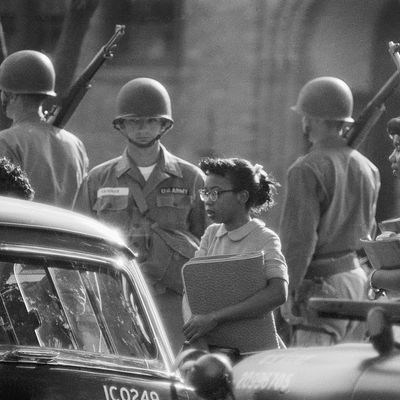
In a highly controversial (so much so that its publication produced anguished protests from Times staffers) New York Times op-ed on Wednesday, Arkansas senator Tom Cotton called on President Trump to invoke the Insurrection Act and send U.S. military units into an undefined number of cities to suppress the “nihilist criminals” and “left-wing radicals infiltrating protest marches.” Cotton has been egging Trump on in this direction for a while now. He may have inspired the president’s threats to “send in the troops,” which Trump did in a June 1 conference call with governors (one participant called Trump’s manner “unhinged”) and then publicly in his Rose Garden remarks that evening, just prior to his infamous stroll to St. John’s Episcopal Church.
It’s a dangerous idea generally, as such revered military veterans as Trump’s own former secretary of defense James Mattis noted yesterday in decrying the politicization of the armed forces it would represent. Given the president’s reckless and divisive character, his taste for militarism, and his desperate need for base-inspiring action, telling him he has the power to take over city streets across the country and crush his enemies while showing up Democrats is like handing a pyromaniac a flame-thrower.
Cotton knows this, but his own reputation for the harshest sort of law-and-order politics is well earned. You wouldn’t expect a man who fought criminal-justice reform tooth and nail in the Senate and said America had an “underincarceration problem” to have much sympathy for protests aimed at addressing police misconduct toward minorities. In an effort to get a grip on what makes Cotton feel so threatening to progressives alert to whiffs of authoritarianism, I once described him as having the “mien and the worldview of a grim and unforgiving lawgiver right out of the Book of Deuteronomy or Calvin’s Geneva.” Likewise Molly Ball wrote that Cotton possessed a “harsh, unyielding, judgmental political philosophy, one that makes little allowance for compassion or human weakness.” Like Trump, he has no patience for “losers,” which disposes him to the use of maximum repressive force to defend privilege and property rights.
So of course when Cotton sees unrest bleeding into violence, he wants to “send in the troops.” In his op-ed, he treated invocation of the Insurrection Act as a ho-hum circumstance utilized by presidents “dozens of times,” a sort of executive flick of the wrist. In fact, all the modern precedents are readily distinguishable from Cotton’s idea of Trump unilaterally deploying U.S. military units to usurp allegedly ineffectual local authority. Yes, during the civil unrest of the 1960s, Lyndon Johnson deployed troops to Detroit in 1967 and Baltimore and Chicago in 1968, but in all three cases the governors of those states requested that intervention. The same was true when George H.W. Bush sent military units to Los Angeles during the Rodney King protests, the most recent invocation of the Insurrection Act. LBJ also brought in Army resources to Washington, D.C., during the March on the Pentagon in 1967 and the post-MLK-assassination violence of 1968, but the capital city was already under direct federal supervision.
The only modern precedents involving a president invoking the Insurrection Act against the wishes of state authorities were Eisenhower’s dispatch of troops to insure the integration of Little Rock schools in 1957, Kennedy’s similar use of U.S. military assets to integrate the University of Mississippi in 1962 and stop racist violence in Alabama in 1963, and Johnson’s deployment of troops to protect the Selma-to-Montgomery marchers in 1965.
Cotton notes these cases but does not acknowledge that what justified all of them was a situation where state and local authorities were in open and explicit defiance of federal court orders aimed at vindicating constitutionally protected rights. These presidents did not “send in the troops” simply to maintain order, or because they deemed local law-and-order measures ineffectual, but because in a very real sense these places were in a state of rebellion led by governors like Orval Faubus, Ross Barnett, and George Wallace (all of whom not-so-secretly welcomed armed federal intervention so as to posture as defenders of Jim Crow).
Are any of the Democratic governors disdained by Trump and Cotton raising flags of rebellion on a pro-looter or pro-rioting platform? Are there any antifa state governments? I don’t think so. Federal military interventions without state and local consent would simply represent a political use of the U.S. Armed Forces to substitute an angry president’s notion of “law and order” for those of the officials elected to make such decisions. Trump does have the power to do so under the Insurrection Act. But the dire consequences of doing so is why sober supporters of constitutional order ranging from Mattis to conservative law professor John Yoo to Trump’s own secretary of defense, Mark Esper, oppose it. The president should listen to them rather than the avid, skull-cracking moralist from Arkansas before playing commander-in-chief with American citizens cast as enemy combatants suitable for being put to death.






























